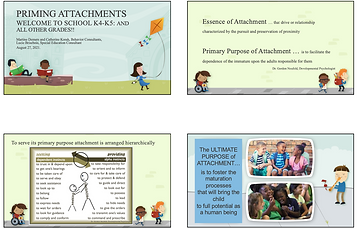Theoretical Framework
ATTACHMENT AND RIGHT RELATIONSHIP
As humans attachment is our primary need. In the context of a safe and caring relationship we can be assured that our needs, both physical and emotional will be met. This is the context in which optimal growth and development happen.
The immature child is meant to depend on the mature adult so that the adult can provide nurturing and guidance. An adult must both love a child and also be willing to guide the child, which at times may mean having the child do something or not do something because it is in their best interest. The guidance is always given in a caring manner, even if it must be firm. This is essential, because a dependent child must have the confidence that the adult is able to handle all the aspects of their care.
For some children, the state of dependence is a vulnerable one and they find it hard to lean on the adult. This can manifest itself in a variety of challenging behaviours that are an attempt to manage a vulnerability too much to bear. The adults who care for these children must see the behaviours as arising from vulnerability and respond in a way that will lower the child’s defenses and soften their heart, so that they can once again depend. When they can depend, then they can rest and grow.
The interventions suggested by CEBM are all designed to help adults and children fall into this “right relationship”.
WEBINAR: Why Relationship Matters
Deborah MacNamara
The desire for relationship and connection is the greatest need humans have. This presentation will focus on the importance of adult relationships for children and/or teens, how they develop, and can be protected in light of disciplinary issues. The importance of human relationships in the maturation process will be discussed as well as the role of shyness in protecting attachments.
The child who is Anxious Webinar
EDITORIAL: Attachment Hunger
Pamela Whyte
Dr. Neufeld frequently compares our need for food with our need for relationship; the more I think about this the more it makes sense. It is easy for us to understand the importance of food for the healthy development of our children; we know they need sleep and safe shelter in order to grow. It is harder for us to grasp the vital importance of right relationship in determining the well being, and even the behaviour of our children.
To read more: https://www.cebm.ca/post/attachment-hunger-1
The Five Things Master Teachers Know and Do
Deborah MacNamara
What is the difference between a great teacher and a master teacher? After years of hiring and working with teachers, along with decades of experience in the classroom, I am convinced there are a few tangible things that set these groups apart. Here are the five things I have learned from being a teacher and watching master teachers in action.
To read more: https://www.cebm.ca/post/the-five-things-master-teachers-know-and-do
The Two Essential Invitations
Lisa Weiner
Dr. Neufeld says that we need to offer our children two invitations. The first is the unconditional invitation to exist in our presence and the second is the invitation to become fully who they are. This same sentiment is sometimes represented imagistically: we are helping them grow both roots and wings.
To read more: https://neufeldinstitute.org/the-two-essential-invitations/
The Dance of Relationships and Why They Matter
Deborah MacNamara
Life is not possible without attachment. We all begin as cells that embed themselves in our biological mother’s womb, with her body providing a warm and safe place for them to multiply and divide. The cellular transformation is breathtaking and provides a beautiful window to watch life unfold through connection. As the umbilical cord emerges in early development, it tethers mother and child to each other.
To read more: http://macnamara.ca/portfolio/the-dance-of-relationships-and-why-they-matter/
Creating a Conscious Invitation into Relationship
Hannah Beach
There is a lot of discussion about the importance of relationship in education – for good reason! Building relationships with our students is a vital part of creating emotionally safe learning communities. I am so grateful to Dr. Gordon Neufeld for developing an accessible and intuitive language around priming and preserving relationships. He speaks about “collecting, bridging, and match-making” as being the three basic attachment rituals.
To read more: https://www.cebm.ca/post/creating-a-conscious-invitation-into-relationship




















